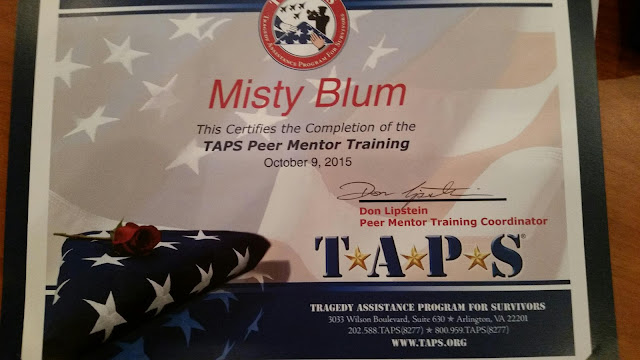TAPS Peer Mentoring
Some people describe the sudden death of a spouse as having the air suddenly taken from their lungs but I would have to disagree. I know that lack of air is certain death. It's been nearly three years since my husband died and I'm still here. I think the death of a spouse or other close loved one is more like the loss of a limb. In most cases it won't kill you but it will permanently alter every aspect of your life and how you live it. You will survive. You're just different. You have to relearn even the basics in life.
TAPS Peer Mentors are like being fitted with a prosthetic limb after the loss of your own. You could probably get by without one but, the introduction of such a device opens up new possibilities to get back to a new "normal" faster and with a renewed determination. The decision to accept a TAPS Mentor is much like the choice to use your prosthetic arm. You make the call. We can be utilized or not. As little or as much as you decide. We are there to assist in this new and sometimes painful journey. We know the struggle will be there with or without us and want to provide a soft place to land when you need to fall apart. We won't tell you how to grieve but provide a safe place to do so with peers who have been there.
I became a Peer Mentor about a year ago. I was very nervous about exactly what the training would entail. I decided to recieve my training at the Annual Suicide Survivors Gathering held in Colorado.(there are several ways to obtain your training and I can share if interested!) I was unsure of what I was walking into, honestly. In my mind a gathering of several hundred people who shared such a traumatic loss seemed like a nightmare. I thought it would be a kin to a long drawn out funeral or memorial service. Tears and silence. How would that help me?
My imagination was nothing like the reality of the event. I can only laugh at my assumptions now looking back. Sure there were tears but more than that were smiles, hugs, shoulders to help carry the burden, offers of support and breakthroughs. The moment I got to the resort I felt "at home". Peer mentor training took place the day before the big kick off of the TAPS National Suicide Survivors Convention. They made arrangements for us to arrive a day earlier and stay in a beautiful room surrounded by the most breath taking views.
I figured then I had nothing to lose. If nothing else I had the opportunity to visit this beautiful resort and with such nice people. The training class was primarily led by Don Lipstine. He is so passionate about what Mentors do and helping survivors that you want to join him the moment he starts speaking. The training was short but intense. Before we could become Mentors we had to dig deep within ourselves and decide if we'd healed enough personally to see past our own loss in an effort to truly aid our potential Mentees. There were tears and laughter but mostly a more comprehensive idea of exactly what was expected of us should we move on. I asked so many questions. We learned there is no right or wrong way to grieve and our job isn't to tell new survivors how to get through it but just "be there".
This is... in my opinion, our first and most important job as Peer Mentors. Just our presence. Because everyone is different. The way we grieve is also as different. We let our Mentees steer the relationship. Some survivors need constant support and assurance and others just need to be reminded periodically that they aren't alone. I think a good Mentor can pick up on the cues and follow the Mentees lead. The training we recieved and lessons we learn while mentoring cross over into our lives in how we interact with others outside of TAPS. The experience provides a wealth of knowledge. It really helps in understanding human nature and relationships.
Becoming a Peer Mentor has been one of the most empowering experiences since the death of my husband. I have moved from the role of a victim to one of a healer. That is so huge. Not only am I helping others in what studies have shown to be the most stressful event in adult life but they are helping me in return. That is profound. That is TAPS Peer Mentoring. I am grateful for my own Mentors who were there in 2013 and I'm proud to assist those who came after me.


Comments
Post a Comment